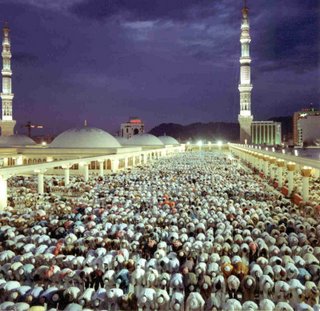Source:http://www.worldpublicopinion.org/pipa/articles/in...
New polls of Muslims from around the world find large and increasing percentages reject suicide bombings and other forms of violence against civilians and say they have no confidence in Osama bin Laden. Nonetheless, in most Muslim countries antipathy toward the United States and the West in general has remained negative or even intensified.
These findings emerge from polls conducted in Muslim nations this spring by two organizations: the Pew Global Attitudes Project, which regularly conducts multinational surveys, and Terror Free Tomorrow (TFT), which studies attitudes toward terrorism around the world.
Aftermath of October 12, 2002, bombing of two nightclubs in Bali, Indonesia. (US Dept. of State)
Strong opposition to terrorism was found among Muslims in seven out of ten countries polled by Pew. This is especially true in the Muslim populations of Indonesia, Pakistan and Turkey, where six in ten or more say that “suicide bombings and other forms of violence against civilian targets” are “never justified.” The TFT poll of Indonesia and Pakistan found even bigger numbers rejecting all attacks on civilians. Pew also found complete rejection of terrorism among very large majorities of Muslims living in Germany, Britain, Spain and France. Trend line data available for some countries also show a significant increase in those taking this position in Indonesia and a remarkable 23 point increase in Pakistan. Only Turkey showed a slight downward movement.
In two countries complete opposition to terrorism was just under half—Jordan and Egypt. However in Jordan—the country for which trend line data is available—there was a very large increase of 32 points among those saying terrorism is never justifiable. Only in Nigeria did less than a third fully reject terrorism, though an additional quarter said that it could rarely be justified.
On bin Laden, Pew found that majorities in eight of the ten countries said they had little or no confidence in the al Qaeda leader. In Jordan, the proportion of respondents saying they lack confidence in bin Laden has nearly doubled over the past year. The two exceptions are Nigeria and Pakistan, where only about a third say they lack confidence. In Europe, most Muslims say they have no confidence at all in bin Laden: eight out of ten in Germany and France; six out of ten in Great Britain and Spain.
But Muslims’ rejection of terrorist tactics and their repudiation of bin Laden has not resulted in greater acceptance of the United States or its war on terror. Nor do Muslims express less hostility toward the West in general. Instead majorities in all of the Muslim countries hold unfavorable opinions about the United States and feel strong opposition to the U.S.-led war on terror. The surveys also document deeply divergent attitudes on such issues as last year’s publication of cartoons depicting the prophet Muhammad.
Rejection of Terrorism
The Pew project and Terror Free Tomorrow asked Muslim respondents whether they believed terrorist violence against civilians was often, sometimes, rarely, or never justified. Pew’s survey found the strongest opposition to terrorism among Indonesian Muslims, where 71 percent say terrorism is never justified and 18 percent say it rarely is. The proportion of Indonesian Muslims who reject terrorism entirely has risen 5 points since 2005 and 17 points since 2002. On the other end of the spectrum, just ten percent of Indonesian Muslims say terrorism is often or sometimes justified, down five points over the past year and 17 points since 2002.
TFT also found that seven out of ten Indonesians (72%) said terrorist attacks were never justified, an increase of 10 points over their 2005 poll. An additional 11 percent said such violence was rarely justified. Only two percent of Indonesians, according to this poll, believe terrorism is sometimes or often justified.
Last October, suicide bombers linked to al Qaeda killed 23 people at three restaurants on the resort island of Bali and in October 2002 coordinated suicide attacks on two nightclubs killed 202 people, mostly Australian tourists. The violence has severely damaged Indonesia’s tourism industry.
Both surveys also show increasing anti-terrorist sentiment in Pakistan. According to Pew, the percentage of Pakistani Muslims who condemn terrorism in all circumstances (69%) is up 23 points from 2005. An additional 8 percent say terrorist attacks are rarely justified. Only 14 percent of Pakistani Muslims are willing to condone terrorism often or sometimes, down from 25 percent last year and 41 percent in 2004.
TFT found even greater opposition among all Pakistanis. Eighty-one percent oppose all terrorism, according to this survey, up eight points from last year. Five percent say it is rarely justified and 11 percent say it is sometimes or often justified.
Pew also surveyed Jordanian Muslims, whose views of terrorist attacks have changed from being mostly positive to largely negative over the past year. Forty-three percent of Jordanian Muslims now say terrorist attacks are never justified, up 32 points from 2005. An additional 28 percent say they are rarely justified. Those who feel such violence can often or sometimes be justified have decreased to 29 percent from 57 percent in 2005.
This shift in Jordanian sentiment occurred after bloody attacks in Amman carried out by terrorists tied to Abu Musab al-Zarqawi. Suicide bombers blew themselves up at three hotels in November 2005, killing about 60 people, including members of a wedding party.
Turkey is the only country surveyed over time by Pew that bucks the trend of declining support for terrorist violence. Though most Turkish Muslims (61%) say terrorist attacks are never justified, that majority has decreased from last year (66%). An additional 9 percent say violence against civilians is rarely justified and 17 percent say it is often or sometimes justified.
Nearly half of Egyptian Muslims (45%), surveyed only this year by Pew, also say that terrorism is never justified; nine percent say it is rarely justified and 28 percent believe it is often or sometimes justified. Nigerian Muslims were also polled for the first time in 2006 and were the only Muslim population surveyed that tended to favor terrorist violence to defend Islam. Only 28 percent of Nigerian Muslims say that terrorist attacks are never justified. An additional 23 percent say they are rarely justified and 46 percent think such killings are often or sometimes justified.
Pew found overwhelming opposition to terrorist attacks on civilians among Muslims in Europe. Eight in ten (83%) German Muslims say suicide bombings are never justified; seven in ten British and Spanish Muslims (70% and 69%, respectively) and six in ten French Muslims (64% ). There was no trend information available on the Muslim minority in Europe.
Declining Confidence in Osama bin Laden
Trend analysis also shows that the general population in predominantly Muslim countries is increasingly disaffected from Osama bin Laden. Fewer respondents in Muslim countries express confidence in the al Qaeda leader today than in previous years, according to results from both surveys. The most dramatic change among the four countries surveyed over time occurred in Jordan and Indonesia.
In Jordan, the number of those expressing confidence in bin Laden has plummeted over the past year. In Pew’s 2006 survey, a quarter of Jordanians (24%) express some confidence in bin Laden and less than one percent say they have a lot of confidence in him. A year ago, six in ten (60%) expressed confidence in bin Laden, including 25% who had a lot of confidence.
In Indonesia, about a third (33%) say they have confidence in bin Laden, but only 4% express a “lot of confidence” in him. This represents only a small change from last year when 35 percent of Indonesians had confidence in bin Laden, including 8 percent who had a lot of confidence. But it is a significant decrease from 2003 when more than half (58%) of those surveyed said they had some (39%) or a lot (19%) of confidence in bin Laden.
Support for bin Laden has also declined in Pakistan and Turkey, according to the Pew project. Today 38 percent of Pakistanis say they have confidence in bin Laden, including 17 percent who say they have a lot of confidence in him. A year ago, 51 percent said they had confidence in the al Qaeda leader, including 29 percent who expressed a lot of confidence. In Turkey, far smaller proportions have faith in bin Laden. Only four percent of Turks express confidence in bin Laden today compared to 15 percent who did so in 2003. Nigerian Muslims, however, are an exception to this trend: six in ten (61%) say they have at least some confidence in bin Laden, up 15 points since 2003.
TFT polled only Indonesians and Pakistanis on bin Laden, asking respondents in 2006 and 2005 how much confidence they had in him to “do the right thing regarding world affairs.” Over the past year, the proportion of Indonesians expressing some or a lot of confidence in bin Laden declined by half, from 23 percent in 2005 to 12 percent. In Pakistan, however, confidence in the al Qaeda leader has remained unchanged at 33 percent, TFT found.
Negative Views of US Unabated
Less support for terrorist attacks and less confidence in Osama bin Laden, however, has not translated into a more positive view of the United States and its policies. Majorities in all five predominantly Muslim countries surveyed by Pew express unfavorable opinions about the United States. That represents an increase in all but one of the four nations over time. In Indonesia, despite U.S. efforts to aid victims of the December 2004 tsunami, those saying they hold very or somewhat unfavorable opinions about the United States rose from 57 percent in 2005 to 67 percent in 2006. Negative views also increased in Turkey (67% to 76%) and Jordan (80% to 85%). Unfavorable opinion about the United States in Egypt, which was only polled this year, stands at 69 percent.
Moreover, Pew found strong opposition to U.S.-led efforts to fight terrorism. All of the Muslim countries surveyed oppose the United States’ global war on terror by margins that have, in most cases, grown larger in recent years. In Turkey, nearly eight in ten (77%) oppose the U.S.-led campaign while only 14 percent favor it. Last year, the margin was 71 percent against and 17 percent for. Eight in ten Nigerian Muslims (77%) also oppose U.S. policies on terror, while only two in ten (19%) support them; in 2003 it was 59 percent vs. 36 percent. About six in ten (57%) of Indonesians oppose U.S. anti-terror efforts today, versus 39 percent in support, while last year half (50%) supported U.S. counterterrorist polices (vs. 42% against).
Only among Jordanians has support for U.S.-led anti-terror efforts grown, though a large majority is still opposed. This year 74 percent say they are against U.S.-led counterterrorism while 16 percent are in favor; last year 86 percent were opposed and 12 percent were in favor. Egyptians, who were only polled this year, are against U.S. efforts by an overwhelming 82 percent, while only 10 percent are in favor.
TFT also found that opinion about the United States was heavily negative. Overwhelming majorities view the United States unfavorably in Saudi Arabia (89%) and the United Arab Emirates (84%). Majorities also hold unfavorable views in Turkey (71%), the Palestinian territories (68%) and Pakistan (64%). Only in Indonesia, does this poll find a population divided somewhat evenly between those with favorable opinions about the United States (44%) and negative ones (41%).
A poll taken in October 2005 by the Anwar Sadat Chair at the University of Maryland and Zogby International found that predominantly Muslim countries saw the United States as a threat to their country. Seven in ten of those polled in six countries (Jordan, Lebanon, Morocco, Saudi Arabia, Egypt and United Arab Emirates) said Israel (72%) and the United States (69%) were the two countries that posed the biggest threat to them. Far smaller proportions named Great Britain (12%) and Iran (3%).
'Generally Bad' Relations with West
Both Pew and Terror Free Tomorrow have documented that negative attitudes in predominantly Muslim countries are not limited to the United States but extend to relations with the West as a whole. Muslims and Westerners interpret certain issues very differently, such as the controversy over last year’s publication of cartoons depicting the prophet Muhammad
The Pew project found that majorities in four of the five Muslim countries and in the Muslim population of Nigeria characterized as “generally bad” relations between Muslims and Western countries such as the United States and Europe. Nigerian Muslims (77%) are the most likely to see relations with the West as bad, followed by Turks (64%), Egyptians (58%) and Indonesians (53%). The exception is Pakistan, where slightly more say relations are good (30%) than bad (25%) but 45 percent are neutral or unwilling to answer. Among respondents saying relations with the West are bad, majorities in all five countries and the Muslim public in Nigeria blame people in Western countries.
The Pew survey also asked Muslims whether they associated a series of positive character traits (generous, tolerant, honest, devout, respectful of women) and negative ones (selfish, arrogant, violent, greedy, immoral, fanatical) with people living in the West. Majorities or pluralities in every Muslim country associate nearly all of the negative traits and almost none of the positive attributes with Westerners.
Pew found, however, that European Muslims were far more positive about the West than those who did not live there. Overall, most European Muslims think that Westerners are generous, tolerant and honest. Majorities in all but one country think that Westerners are respectful of women. The exception is Great Britain, where only half (49%) of the Muslim population believes Westerners respect women.
Overwhelming majorities in predominantly Muslim countries say the controversy over the publication of cartoons depicting Muhammad was the result of “Western nations’ disrespect for the Islamic religion” rather than “Muslim intolerance to different points of view,” according to the Pew poll. Ninety percent of Jordanians cite Western disrespect, 87 percent of Egyptians, 86 percent of Indonesians, 84 percent of Turks and 81 percent of Nigerian Muslims. On this issue, Muslims in Europe are nearly as adamant: 80 percent in Spain, 79 percent in France, 73 percent in Great Britain and 71 percent in Germany choose Western disrespect. That answer puts Muslims at odds with the general population of Europe, where majorities in France (67%), Germany (62%), Great Britain (59%) and Spain (53%) say Muslim intolerance caused the controversy.
The TFT survey also found that majorities in Pakistan, Saudi Arabia, United Arab Emirates, Turkey and the Palestinian territories viewed the cartoons as a sign of Western hostility toward their religion. Respondents were asked which statement about the decision to publish the cartoons was closest to their opinion: it was an “isolated example that does not reflect the overall views of the West toward Islam;” it reflected “the increasing secular attitudes of the West towards all religions;” or it demonstrated “Western antagonism against Islam itself.” The last statement is favored by wide margins in Pakistan (67% vs. 24% for the other two), Turkey (67% vs. 20%) and Saudi Arabia (65% vs. 35%). Smaller majorities say the cartoons reflect Western antagonism in United Arab Emirates (56% vs. 43%) and the Palestinian territories (52% vs. 46%).


























.png)



